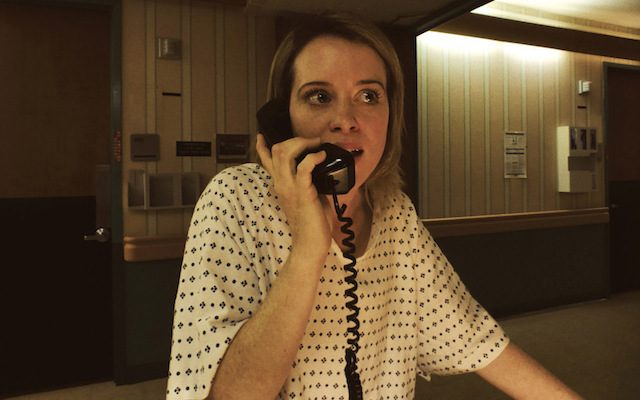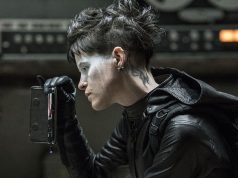
Steven Soderbergh’s latest film, the shrewd, exasperating psychological thriller “Unsane,” is one of his experimental projects, shot entirely on an iPhone. It looks awful — harsh, garish, cheap, like he didn’t even use a new iPhone. The shots are nicely composed and smartly framed, though; you can tell it was made by a real director who for some reason wanted it to have the aesthetic of a student film.
Appearances aside (just pretend film isn’t a visual medium), the movie has some heft to it but doesn’t live up to its full potential. Claire Foy, doing an American accent about 70% of the time, stars as Sawyer Valentini, a young woman who moved from Boston to Pennsylvania to get away from a stalker but did not change her name, probably because it was too cool to give up. Sawyer has PTSD now, unable to relax in her new surroundings because she sees her stalker everywhere. She visits a therapist at a for-profit mental-health facility called Highland Creek and is soon surprised to find herself committed — voluntarily, technically, because she signed the paperwork, but she didn’t read it first, or ask enough questions or assert herself afterward.
She meets the usual suspects in the cuckoo’s nest, including Juno Temple as a frazzled girl named Violet and Jay Pharaoh as someone who, like herself, doesn’t seem to belong in the booby hatch. Sawyer freaks out on a male staff member when she momentarily sees her stalker’s face instead of his, and then it gets worse: She thinks another Highland Creek employee (Joshua Leonard) actually IS the stalker, having somehow tracked her here.
She must be crazy after all, right? OR MAYBE NOT! OR MAYBE SHE IS, YOU WERE RIGHT THE FIRST TIME!
That aspect, the uncertainty over Sawyer’s mental health, propels the first two-thirds of the movie, forcing us to second-guess our assumptions in a way that’s intriguing without being maddening. The screenplay, by the duo behind garbage comedies “The Spy Next Door,” “Just My Luck,” and “Larry the Cable Guy: Health Inspector” — their names are Jonathan Bernstein and James Greer, and good for them — further keeps us on our toes with potential red herrings like a sub-thread about uncovering unethical medical practices and a visit from Sawyer’s mother (Amy Irving).
But the film tips its hand too early, revealing the reality of things when there’s still time to fill. Much of what happens after that is “shocking” but not surprising because, once the reveal was made, it was inevitable. I lost patience with the movie somewhere around there, but I ultimately came down on the favorable side because of Joshua Leonard’s crucial performance as the maybe-stalker and Claire Foy’s increasingly unraveled performance (dodgy accent notwithstanding) as Sawyer. The film’s sheer visual ugliness is a hindrance, but it’s evidently what Soderbergh wanted, so more power to him.
B- (1 hr., 37 min.; )




